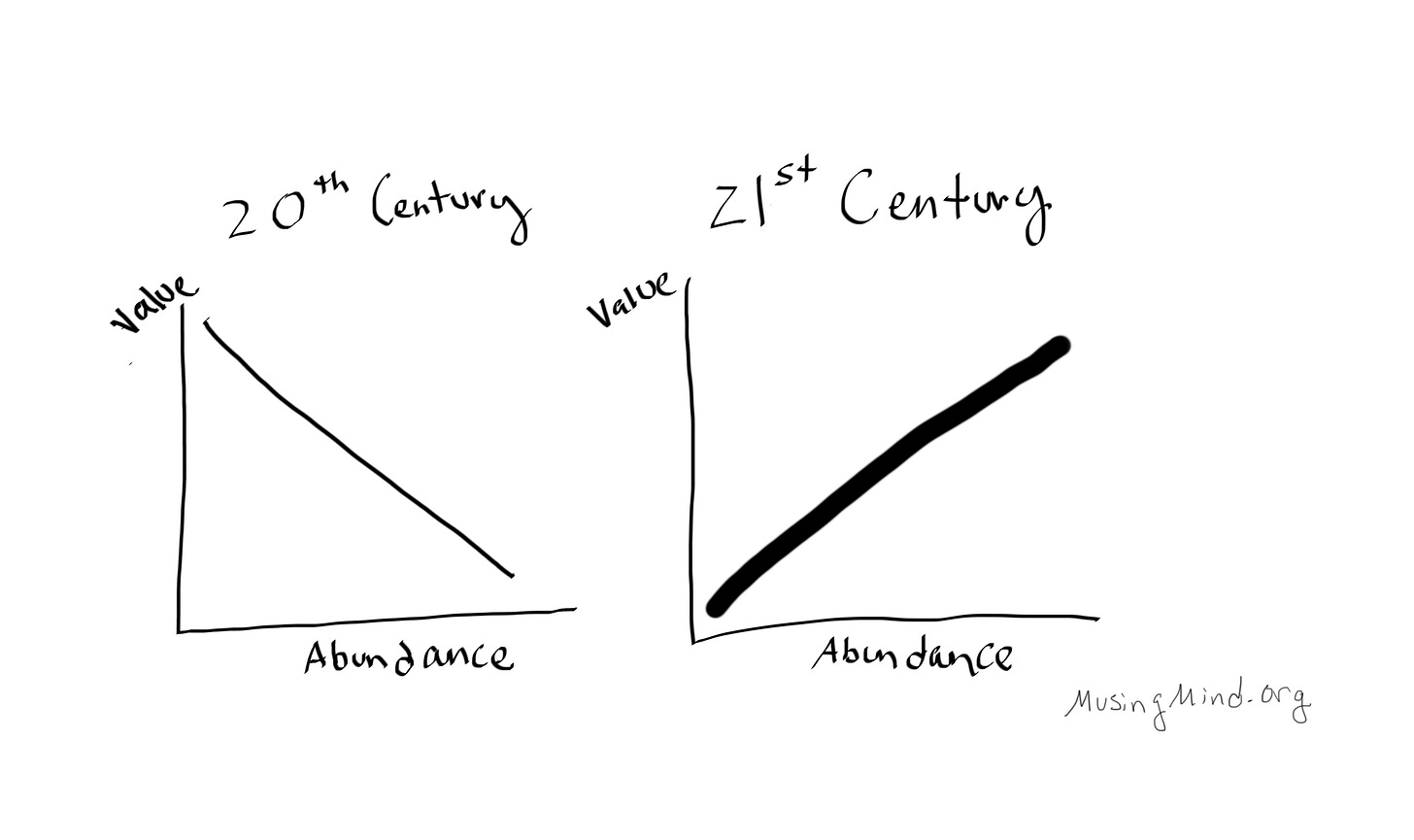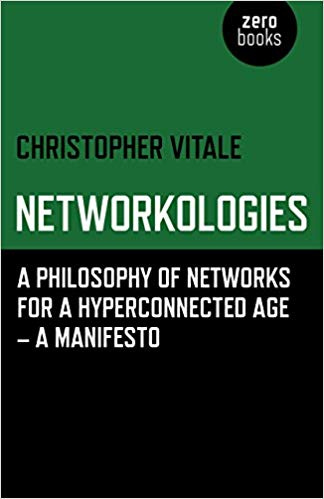Mind Matters
The Era of Networks, Leverage Points, & Healthy Doses of Weird
Hello, fellow humans -
A few quick updates:
Podcast is zooming along. Finished recording second episode with the wonderful Erik Hoel. Only one more episode to record before I launch the podcast publicly, and that conversation is already lined up. I’ll be speaking with Andrew Taggart.
Taggart combines serious contemplative practice, a PhD in philosophy, and a zoomed-in lens on the cultural centrality of work in modern life. He’s writing a book that takes Josef Pieper’s concept of Total Work and explores its role in crafting modern mentalities. I wrote about Pieper’s work recently, so I’m excited to jam about how modern work creates modern consciousness, and how we might tinker with that system.A new project of mine is to decipher what ‘post-capitalism’ might actually look like. Specifically, I’m interested in better understanding whether critiques of capitalism really call for a move beyond capitalism (into what?), or just a repurposed capitalism.
I put together a Twitter thread to add findings as I come across them, and I’m creating a page on the MusingMind website to serve as HQ for the question of Post-Capitalism. In the meantime, if you have any leads on post-capitalist reading, let me know. Thread to gather info/plant seeds on: What is "Post-Capitalism?" The more I dig into capitalist critique & the cultural consciousness it reifies, the less clear I am on what "post-capitalism" really means "It's easier to imagine the end of the world than the end of capitalism"
Thread to gather info/plant seeds on: What is "Post-Capitalism?" The more I dig into capitalist critique & the cultural consciousness it reifies, the less clear I am on what "post-capitalism" really means "It's easier to imagine the end of the world than the end of capitalism"
The Era of Networks
Back in 1997, Kevin Kelly made an outrageously perceptive insight. He wrote that the era of computers is finished - that in 1997, computers themselves wouldn’t change our lives much. Rather, all major changes to come would be located in the networks they afford, rather than the devices themselves.
“The grand irony of our times is that the era of computers is over. All the major consequences of stand-alone computers have already taken place. Computers have speeded up our lives a bit, and that’s it. In contrast, all the most promising technologies making their debut now are chiefly due to communication between computers that is, to connections rather than to computations.”
Today, Paul Mason writes in PostCapitalism: A Guide to Our Future, “we understand implicitly that the network is the machine.”
The network is the machine.
The network, rather than the computer, is the paradigm-shifting advent we’re living through. Networks are the fulcrum upon which culture will pivot from what it was to what it will become.
Mason continues:
“In 1997, Kelly proclaimed the existence of an emerging new economic order with three main characteristics: ‘It is global. It favors intangible things – ideas, information, and relationships. And it is intensely interlinked. These three attributes produce a new type of marketplace and society.’”
I’m taking this to heart. I’m exploring what it means to intertwine my life with the new affordances of a networked society. It’s why I’m starting a podcast, why I use Twitter, why I’m always wondering how to refract more of myself through my website. It’s why I’m pushing through the vague apprehension that publishing writing online is somehow sacrilegious to writing as a form of art, or dilutes one’s motives.
Networks flip the traditional logic of value on its head. Where value used to stem from private entities selfishly hoarding slivers of competitive advantage, in a networked economy, value increases in tandem with abundance. Value and abundance form a positive feedback loop.

Here’s Kevin Kelly again:

Zak Stein’s term, A Time Between Worlds, is a marvelous fit for this cultural moment. The world where value derives from scarcity is ending; the world where value might hitch a ride with abundance is forming.
So when Stein writes:
“I seek to disclose the reality of universal human emancipation that is always already immanent as a possibility latent in human social structures. The pulse of freedom, as it were, is irrepressible, ubiquitous, and indefatigable.”
I think the skeleton & nervous system of the network society are already here, latent beneath the last remnants of the 20th century cultural logic. The conduit between value and abundance is already operational, and early-adopters are flocking like pilgrims to new, fertile land.
This frozen moment between worlds is an opportunity to play, explore, and participate in the emergence of a new cultural context (if you’re not familiar with Daniel Thorson, check out his conversation with Vince Horn of the Buddhist Geeks podcast. Daniel is one of the most cogent, humble, and robust players in the space of what’s emerging). With a renewed, positive-sum relationship between value and abundance, the old project of democracy finds new life. Walt Whitman’s democracy, the perennial project of democratizing abundance, richer modes of being, that latent pulse of freedom, is revitalized in an era where value and abundance move in the same direction.
If human beings are products of their cultural ethos, I cannot imagine what sorts of human beings the networked society might bring forth. It certainly seems industrial society produced industrialized humans, or maybe that’s just the Marxist in me. But, contrary to prevailing dystopian tendencies, I feel fortunate to be alive during a moment in history where I might bear witness to what might be nothing less than the creation and proliferation of a new variety of human. Again, from Stein:
“Groups can change society by establishing alternate modes of education; new modes of education shape the future of all political and economic life because they involve the creation of a new kind of human.”
ANYWAY.
The new cultural logic of networks is fascinating, and I’m looking for reading. I’ve ordered Christopher Vitale’s Networkologies. Any further suggestions, please send them on over!

I also highly recommend Kevin Kelly’s full essay on The Network Economy.
Malice in Wonderland
I’m slightly worried that by sharing this video, I’m unconsciously participating in some covert brainwashing operation, but probably not.
This video is weird. The kind of weird that, if you resist your initial aversion to it, might help stretch the waking mind and keep it limber. It’s the sort of departure from normalcy that unhinges expectations, and leaves you confused, in the way that seeing a horse wearing a Tuxedo and reading Tolstoy on the New York City subway might.

I think doses of this sort of utter psychedelic nonsense is healthy - like a vitamin guarding against what Erik Hoel calls overfitting - when the brain comes to believe too strongly in the sense it’s already made of the world, and becomes overfit to the experiential data it uses to model reality. It loses the ability to stretch and perceive in unconventional ways. To apprehend novelty:

Anyway, here’s the video. I hope I’m not perpetuating some weird brainwashing plot.
Leverage Points in a System
Brilliant essay. Leaves me excited to be a living, conscious being in the world. Somehow moves from the systems analysis/complexity science world into this excerpt, which is the kind of so-far-from-the-starting-point conclusion that great essays manage to make possible:
“There is yet one leverage point that is even higher than changing a paradigm. That is to keep oneself unattached in the arena of paradigms, to stay flexible, to realize that NO paradigm is “true,” that every one, including the one that sweetly shapes your own worldview, is a tremendously limited understanding of an immense and amazing universe that is far beyond human comprehension. It is to “get” at a gut level the paradigm that there are paradigms, and to see that that itself is a paradigm, and to regard that whole realization as devastatingly funny. It is to let go into Not Knowing, into what the Buddhists call enlightenment.
People who cling to paradigms (which means just about all of us) take one look at the spacious possibility that everything they think is guaranteed to be nonsense and pedal rapidly in the opposite direction. Surely there is no power, no control, no understanding, not even a reason for being, much less acting, in the notion or experience that there is no certainty in any worldview. But, in fact, everyone who has managed to entertain that idea, for a moment or for a lifetime, has found it to be the basis for radical empowerment. If no paradigm is right, you can choose whatever one will help to achieve your purpose. If you have no idea where to get a purpose, you can listen to the universe (or put in the name of your favorite deity here) and do his, her, its will, which is probably a lot better informed than your will.
It is in this space of mastery over paradigms that people throw off addictions, live in constant joy, bring down empires, get locked up or burned at the stake or crucified or shot, and have impacts that last for millennia.”
One moment that stood out. She’s describing leverage points in systems. The points where small changes can spark big changes in that system. She writes that we’re pretty good at finding these leverage points, but that we tend to read them entirely backwards. Leverage points are counterintuitive, so when we discover them, we tend to push in the wrong direction, and catalyze exactly the opposite of the change we’re hoping for.
To illustrate this, she uses the example of economic growth. Some world leaders identified economic growth as the leverage point to solve major global problems like poverty, hunger, ecological desecration, and so on. But, too often, we’re pushing on that leverage point in the wrong direction. Growth might be the correct leverage point, but rather than pushed forwards into more growth, the counterintuitive, but required direction is less.

Dispatch from Infinite Jest
~300 pages in, the dense chestnut that is David Foster Wallace’s Infinite Jest is finally beginning to crack open. He writes, describing the dawning era of infinite entertainment through the vantage point of a weird guy who sits cross legged in the boys locker room and imparts wisdom to anyone that lets him lick the sweat off their streaking bodies:
"This appetite to choose death by pleasure if it is available to choose - this appetite of your people unable to choose appetites...The choice for death of the head by pleasure now exists..."
The choice for death of the head by pleasure now exists. The question is, what other choices are there, and how can we overcome our instinctual lurches toward choices that lead to ‘death of the head’?
"How for the person to freely choose? How to choose any but a child's greedy choices if there is no loving-filled father to guide, inform, teach the person how to choose? How is there freedom to choose if one does not learn how to choose?"
This is what I consider the meta-modern pickle. How might we learn how to choose? What rubrics will establish good choices from bad ones? Freedom is only as valuable as our ability to navigate through it skillfully. Freedom devoid of skillful choice is a dangerous space.


That’s all.
As always, feel free to reach out for any reason, or check out the full website: www.MusingMind.org.
If you find any value here, feel free to support me by sharing the website or newsletter link - musingmind.substack.com - with friends. Or hit this button to subscribe:
Cheers,
Oshan